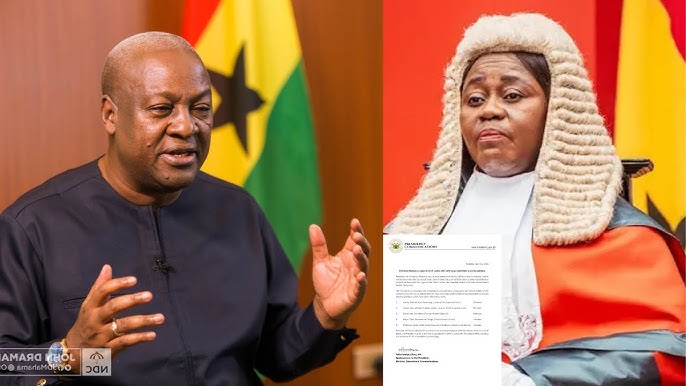Ghana’s President John Dramani Mahama has suspended Chief Justice Gertrude Araba Esaaba Sackey Torkornoo. This follows the establishment of a prima facie case in response to three separate petitions advocating for her removal. The announcement, made on April 22, underscores a significant moment in Ghana’s judicial history.
The decision, aligned with Article 146(6) of the 1992 Constitution, was taken after consultations with the Council of State. It initiates a formal inquiry into the Chief Justice’s conduct, marking a pivotal instance of judicial accountability in the country.
While the allegations within the petitions remain undisclosed, their emergence has sparked vigorous discussions within legal and political communities.
Chief Justice Torkornoo was presented with copies of the petitions and given 10 days to respond, in accordance with constitutional protocols. She submitted her written defense on April 7, which underwent thorough review by the President and advisors. This process culminated in the determination of a prima facie case, leading to her suspension.
To ensure an impartial and comprehensive investigation, a five-member committee has been formed under Article 146(6). The committee comprises the following members:
- Justice Gabriel Scott Pwamang, Justice of the Supreme Court – Chairman
- Justice Samuel Kwame Adibu Asiedu, Justice of the Supreme Court – Member
- Daniel Yaw Domelevo, Former Auditor-General – Member
- Major Flora Bazwaanura Dalugo, Ghana Armed Forces – Member
- Professor James Sefah Dzisah, Associate Professor, University of Ghana – Member
This committee is tasked with examining the petitions and presenting findings to the President. During this period, Chief Justice Torkornoo’s suspension will remain in effect, as stipulated by Article 146(10) of the Constitution.
The suspension has ignited debates about the balance between accountability and institutional stability. Many view this as a defining chapter in Ghana’s governance, given its implications for the judiciary’s integrity.
Legal experts and political analysts are closely monitoring the developments, which may set a precedent for handling similar cases in the future.
As the committee embarks on its investigations, the nation awaits insights that could either reaffirm confidence in its judicial system or expose areas needing reform. For now, the focus remains on upholding constitutional principles and ensuring fairness in addressing the allegations.

